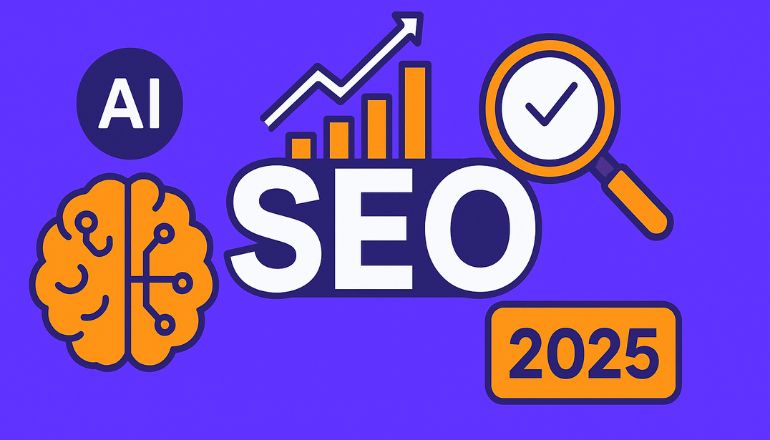
AI SEO Strategies 2025: Smarter Optimization for Higher Rankings
Search engine optimization (SEO) is evolving rapidly, and AI-driven strategies are at the forefront of this transformation. With Google’s continuous algorithm updates and the rise of AI-powered tools, staying ahead in 2025 requires a deep understanding of AI SEO strategies. This guide will explore how artificial intelligence is reshaping SEO, from content creation to keyword research, and how you can leverage AI to improve search rankings.
BOOST YOUR SEO PERFORMANCE
Smart AI-powered tools to grow your traffic faster
How Can AI SEO Strategies help You Achieve Smarter Optimization and Higher Rankings?
AI SEO strategies in 2025 offer a cutting-edge approach to staying visible and competitive in search engine results. These smart techniques use artificial intelligence to enhance every aspect of SEO from intelligent keyword research and content creation to voice search optimization, UX improvements, technical audits, and predictive analysis. By leveraging AI tools like ChatGPT, Surfer SEO, and Clearscope, businesses can better understand user intent, generate helpful content, automate SEO tasks, and adapt quickly to algorithm changes. Implementing AI SEO strategies ensures not only higher rankings but also a more personalized, efficient, and future-proof digital marketing strategy.
The Role of AI in SEO
Artificial intelligence has significantly changed how search engines interpret and rank content. Google’s AI-powered algorithms, such as RankBrain and BERT, focus on understanding search intent rather than just matching keywords. This shift means that businesses must align their content with user intent, ensuring it provides real value rather than simply targeting keywords.
According to a study by Moz, “Google’s AI systems prioritize relevance and user satisfaction, making content quality a top ranking factor.” This emphasizes the need for AI-driven content optimization that goes beyond traditional SEO tactics.
Top AI SEO Strategies for 2025
1. AI-Driven Keyword Research
Gone are the days of manually finding keywords with high search volumes. AI-powered SEO tools like Semrush, Ahrefs, and Google’s Keyword Planner now analyze search trends and predict emerging keywords.
A report by Search Engine Journal states, “AI tools help identify long-tail keywords and user intent, leading to higher engagement rates and better rankings.” Leveraging AI to find untapped keywords can give you a competitive edge in search results.
2. AI-Powered Content Creation & Optimization
Content quality remains a priority, and AI can enhance it in multiple ways:
- Generating high-quality content: Tools like ChatGPT, Jasper, and Copy.ai help create engaging, well-structured articles.
- Optimizing readability and structure: AI analyzes readability scores, paragraph length, and formatting for better user experience.
- Enhancing engagement: AI can suggest FAQs, internal links, and even personalized content recommendations.
Google’s Helpful Content Update prioritizes content that genuinely serves users. According to Google’s guidelines, “Content that demonstrates expertise, authoritativeness, and trustworthiness (E-A-T) is more likely to rank well.” Using AI to analyze and refine content ensures it meets these criteria.
3. Voice Search & Conversational SEO
With voice search becoming more prevalent, optimizing for natural language queries is crucial. AI tools analyze conversational search patterns, helping businesses tailor content for voice assistants like Google Assistant, Siri, and Alexa.
A study by BrightLocal found that “58% of consumers have used voice search to find local business information in the last year.” Optimizing content for question-based queries and featured snippets can improve visibility in voice search results.
4. AI-Powered Link Building
Backlinks remain a critical ranking factor, but AI is revolutionizing link-building strategies:
- Identifying high-quality link opportunities: AI analyzes authoritative domains for guest posting and outreach.
- Preventing toxic backlinks: AI-powered SEO tools like Ahrefs and Majestic detect harmful links that could lead to penalties.
- Automating outreach: AI personalizes outreach emails to improve response rates from website owners.
5. AI and User Experience (UX) Optimization
Google’s Core Web Vitals update emphasizes UX as a ranking factor. AI-driven analytics help identify issues like slow loading times, poor mobile responsiveness, and user behavior patterns.
A study by Backlinko found that “websites with fast load times and excellent UX tend to rank higher on Google.” AI tools like Google PageSpeed Insights and Hotjar provide real-time UX improvements, leading to better rankings.
6. AI-Powered Technical SEO
Technical SEO is essential for search visibility, and AI can streamline this process:
- Automating site audits: AI tools scan websites for broken links, duplicate content, and schema markup issues.
- Improving crawl efficiency: AI optimizes XML sitemaps and robots.txt files for better indexing.
- Enhancing mobile SEO: AI ensures websites are fully optimized for mobile-first indexing.
7. Predictive SEO & Trend Analysis
AI can predict future SEO trends by analyzing search patterns and user behavior. Google’s Search Trends and AI-driven analytics help businesses stay ahead of competitors by identifying upcoming keyword opportunities and content gaps.
According to Neil Patel, “AI-powered predictive analysis helps businesses create content that aligns with emerging search trends, ensuring long-term SEO success.”

Read More: Ai seo tools scale agile solutions
Implementing AI SEO Strategies: Actionable Steps
To stay competitive in 2025, follow these steps to integrate AI into your SEO strategy:
- Invest in AI-powered SEO tools: Utilize platforms like Surfer SEO, Clearscope, and Frase to optimize content.
- Focus on user intent: Align content with what users are searching for, not just specific keywords.
- Leverage AI for data-driven decisions: Use AI analytics to refine keyword strategies, improve UX, and enhance site performance.
- Optimize for voice search: Implement structured data and question-based content for better voice search rankings.
- Monitor AI-driven insights: Regularly track SEO performance and adapt strategies based on AI recommendations.
- Use AI for real-time competitor analysis: AI can track competitors’ SEO strategies, helping businesses stay ahead in search rankings.
- Implement AI-powered A/B testing: AI tools can test different SEO strategies and suggest optimal content formats and keyword placements.
- Automate local SEO: AI can optimize Google My Business profiles and manage customer reviews to enhance local search visibility.
- Personalize content experiences: AI can customize website content based on user preferences, increasing engagement and retention rates.
- Enhance AI-driven image & video SEO: AI tools optimize multimedia content by generating alt text, analyzing visual elements, and improving accessibility.
Conclusion
AI is transforming SEO, making optimization smarter and more efficient. By embracing AI-driven keyword research, content creation, voice search, and UX enhancements, businesses can stay ahead in 2025. As Google continues to prioritize user-centric content, leveraging AI tools will be essential for achieving higher search rankings and sustainable organic growth.
By implementing these AI SEO strategies, you can future-proof your website and ensure continued success in search engine results. Start leveraging AI today and stay ahead of the competition!
FAQ
How will AI SEO strategies evolve in 2025?
In 2025, AI SEO strategies will increasingly leverage generative AI, machine learning, and predictive analytics to understand user intent, create semantic content, and optimize websites for AI-powered search results like Google SGE.
How can AI improve content optimization?
AI can suggest relevant keywords, generate topic clusters, optimize meta tags and headings, improve readability, and provide insights into content gaps, helping websites rank higher and attract more targeted traffic.
Can AI help with technical SEO?
Yes. AI tools can automatically detect and fix issues like broken links, slow page speed, duplicate content, and schema errors, ensuring websites comply with search engine requirements.
Can AI help with technical SEO?
Yes. AI tools can automatically detect and fix issues like broken links, slow page speed, duplicate content, and schema errors, ensuring websites comply with search engine requirements.
How does AI enhance user experience for SEO?
AI analyzes user behavior to optimize page layout, navigation, and content recommendations, creating a more engaging and personalized experience that positively impacts SEO metrics like dwell time and bounce rate.
Do you think AI-driven SEO tools will eventually replace traditional SEO experts, or will there always be a need for human input in strategy planning
We just started using Surfer SEO and Clearscope at my agency can confirm the impact is huge. Our organic traffic is already seeing a 20% boost in just 3 weeks.
This guide is packed with practical tips. The section on predictive SEO really stood out most blogs skip over it, but it’s so relevant for staying ahead.